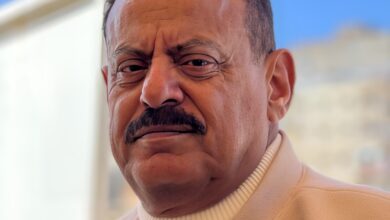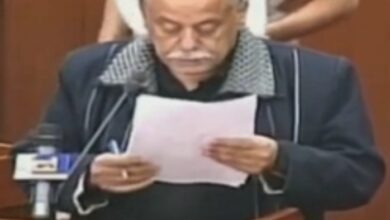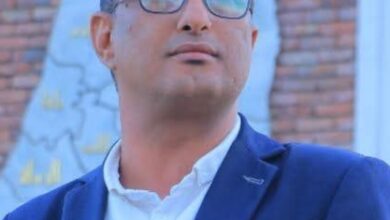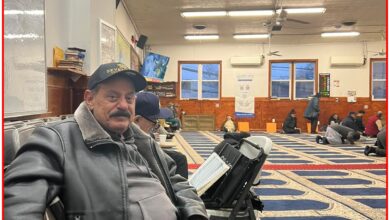Remnants of Fear
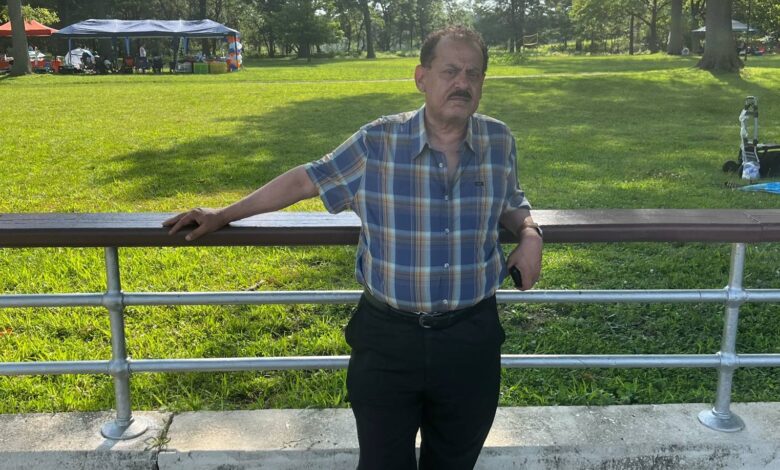
Yemeni mp
Ahmed Saif Hashed
I feel confusion and embarrassment wash over me. I watch my voice tremble, its tones disrupted, its flow lost. It seems as if the inhabitants of the earth are observing my faltering, stammering voice, while my breaths race against one another, akin to an unprecedented marathon. A wave of anxiety grips me, making me feel as if my vocal cords are tearing apart in the face of an insurmountable storm.
My weary soul feels frayed under the piercing gaze of those who watch me or follow my anxious speech. The beats of my heart escalate, leading me to believe my spirit might escape from my mouth. Perhaps I even sweat, no matter how cold the weather may be. Overall, I feel a profound disarray akin to an earthquake measuring eight on the Richter scale.
Dr. Dean Burnett’s insights in his book, The Idiot Brain, resonate with the phobia and feelings that have plagued me at times. Burnett cites examples of individuals afflicted by anxiety—one of whom I closely relate to—who would rather wrestle a wild cat than sing karaoke. They would prefer to handle live explosives than perform in front of an audience. If given the choice between singing and wrestling, they would undoubtedly choose the latter.
* * *
I have repeatedly failed in love due to the overwhelming weight of my shyness and fear. I have lost more than one love in my life, living out an incomplete romance, simmering on a hot plate. I have been scorched by the repetition of my many disappointments. Countless dreams have evaporated because of this shyness and anxiety that have consumed me for years. Perhaps I have also squandered numerous opportunities that could have transformed my life. Shocks and disappointments have driven their stakes deep into my troubled soul, digging their claws into my mind, which has weighed heavily upon me, to the point where I sometimes find it a struggle to pull it along with me.
Shyness and social anxiety are deep-rooted issues I have grappled with since childhood. They are psychological barriers that have plagued my life, more than mere obstacles; they have led to numerous defeats, some of which have profoundly impacted my spirit, future, and squandered opportunities. I have often felt like I am incapacitated from head to toe. It seems that every part, every muscle, and every nerve in my face and limbs betrays me at the most crucial moments when I desperately need stability and composure. My entire nervous system feels disordered, and I sense a turmoil engulfing my being, failing miserably to control it, as if it were a fate that has become impossible to resist.
This intense mixture of shyness and social anxiety continues to assail me, recurring from time to time, sometimes briefly, other times lingering, or reappearing after a period of forgetfulness. Occasionally, I find it lurking even at this advanced age, leading me to half-believe the truth in Voltaire’s words: “Shame is a ghost that cannot be defeated.”
* * *
During the session of the Parliament held on August 13, 2016, to bless the formation of the Supreme Political Council, I was the only one present who declared my position in a statement affirming its unconstitutionality. I rejected war and aggression, as well as the local political parties and forces, regardless of their affiliations, resorting to armed violence to resolve their political disputes, and calling upon outside assistance. I protested against everyone, condemning all, including the de facto authority in Sana’a. Perhaps I was the first to use this term, which angered the Deputy Chairman of the Council during one of the meetings that were not broadcast.
My anxiety overwhelmed me during that public session with a forceful intensity. The scars from that moment still run deep within me, particularly when some colleagues in the council and others outside it mocked me; among them was a comrade who saw me on television as I read my statement of rejection and objection to the formation of the Supreme Political Council in Sana’a, citing its unconstitutionality and lack of legitimacy.
As I read my statement, I did so with urgency, my voice trembling and breaths coming in quick, uneven gasps. The shaking of my hands and fingers gripping the paper was painfully evident, while another intense tremor coursed from my feet up through my body. I admit I failed to control it, despite my repeated attempts. Those behind me, the fellow representatives, could easily notice my condition.
* * *
Despite all this, I take pride in having been the only one among all present to boldly say “no” to everyone, with strength, will, and presence. I was the sole voice opposing what was being legitimized in a council that had lost all respect for itself, failing to honor the solemn oaths they had taken before this assembly.
I stood firm with the most important and resolute stance, one that did not waver or yield to weakness. My defiant voice resonated in the parliamentary hall, rejecting the legitimization of tyranny and vehemently opposing what I perceived as a blatant violation of the constitution, the law, and conscience. It aligned perfectly with the essence of my voice and the dictates of my living conscience at a moment fraught with difficulty and complexity.
Despite my fear, I find myself crushing my hypocrisy daily. I rebel against my fears and rise up. I gamble and take risks for a conscience that has burdened and tormented me, yet I have never abandoned it. I have lived through its struggles against adversaries who possess everything, while I stand defenseless, armed only with hope, a pen, and a distant dream that remains elusive, perhaps even impossible to achieve.
What I have experienced in terms of anxiety is incomparable to what they have inflicted. There is no comparison between my actions and the deeds they have committed. Many politicians and representatives have firmly placed their hands on the Quran, swearing an oath before witnesses that they would uphold the constitution, the law, the republican system, unity, sovereignty, and independence, only to break that oath a day or a year later.
They have long descended upon the 1990 Constitution, which was ratified by popular referendum, the very social contract of unity. They have continually turned against its virtues until those virtues have become but a distant memory. They gnawed at it until the rights of our people within it felt as if they had been consumed entirely.
It all began with constitutional amendments, made once and twice, without any referendum as stipulated by the unity constitution of 1990, which had been approved by the populace. Then came the coup against this constitution under the guise of the “Gulf Initiative,” which imposed guardianship over our people and their future. Following this was the 2014 “Houthi” constitutional coup, and then the severe transgressions that ensued from those who call themselves the “legitimacy” and their supporters, culminating in the constitutional declaration of April 2022, which targeted the very essence of the constitution itself, emptying it of its fundamental principles.
I was struck by what my friend, lawyer, writer, and poet Jalal Hindad wrote in his commentary on the latest coup against the constitution and the oath taken by members of the Parliament in Aden in April 2022. He stated:
“They swear the constitutional oath in appearance, while in reality, they are tasked with suspending the operation of the constitution—an act tainted by the equation of war—and completing the dismantling of the institutional and constitutional framework of the political state that has accumulated over six decades, paving the way for the establishment of a new structural political framework for the state, detached from the historical context of the political movement in Yemen and its various intrigues!”
He further warned: “The political system of the Republic of Yemen is undergoing one of the most critical turning points it has ever faced since the outbreak of the September 1962 revolution! At a time when historical political factions and most national figures have become entangled and complacent, losing their grip on resistance due to their recklessness and misreading of the situation, we, as Yemenis, must not remain silent in the face of this grand demolition project that the Houthi group has managed to impose with regional acquiescence and implicit international approval. We were stunned as elites, writers, professionals, and Yemeni blocs with no tools to manage the conflict, to say no to what is happening!”
Today, nearly all who have taken the oath have turned their backs on the constitution, even desecrating it. Some have corrupted themselves to the point of drowning in corruption up to their ears and hair. Others have borne treachery within them, nurturing it in their arms, carrying it on their backs, reaping vast wealth from it, and thriving on betrayal, deceiving a people and a homeland until disaster struck. We do not know how many decades or years it will take to restore our unity, future, and grand dreams.
* * *


